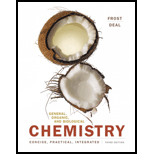
a.
To determine:
Whether the given compound (a.) is primary, secondary or tertiary alcohol.
Introduction:
Alcohol is an organic compound which is produced by the process of fermentation of simple carbohydrates or sugars. Alcohols contain a carbon atom attached to hydroxyl (OH) groups and alkyl group. Alcohols are classified as primary, secondary, and tertiary alcohol on the basis of the number of alkyl groups attached to the alcoholic carbon which is attached to hydroxyl group.
Primary alcohols are those compounds in which the alcoholic carbon (OH bonded carbon) is attached to only one alkyl group.
Secondary alcohols are those compounds in which the alcoholic carbon (OH bonded carbon) is attached to two alkyl groups.
Tertiary alcohols are those compounds in which the alcoholic carbon (OH bonded carbon) is attached to three alkyl groups.
b.
To determine:
Whether the given compound (b.) is primary, secondary or tertiary alcohol.
Introduction:
Alcohol is an organic compound which is produced by the process of fermentation of simple carbohydrates or sugars. Alcohols contain a carbon atom attached to hydroxyl (OH) groups and alkyl group. Alcohols are classified as primary, secondary, and tertiary alcohol on the basis of the number of alkyl groups attached to the alcoholic carbon which is attached to hydroxyl group.
Primary alcohols are those compounds in which the alcoholic carbon (OH bonded carbon) is attached to only one alkyl group.
Secondary alcohols are those compounds in which the alcoholic carbon (OH bonded carbon) is attached to two alkyl groups.
Tertiary alcohols are those compounds in which the alcoholic carbon (OH bonded carbon) is attached to three alkyl groups.
c.
To determine:
Whether the given compound (c.) is primary, secondary or tertiary alcohol.
Introduction:
Alcohol is an organic compound which is produced by the process of fermentation of simple carbohydrates or sugars. Alcohols contain a carbon atom attached to hydroxyl (OH) groups and alkyl group. Alcohols are classified as primary, secondary, and tertiary alcohol on the basis of the number of alkyl groups attached to the alcoholic carbon which is attached to hydroxyl group.
Primary alcohols are those compounds in which the alcoholic carbon (OH bonded carbon) is attached to only one alkyl group.
Secondary alcohols are those compounds in which the alcoholic carbon (OH bonded carbon) is attached to two alkyl groups.
Tertiary alcohols are those compounds in which the alcoholic carbon (OH bonded carbon) is attached to three alkyl groups.
d.
To determine:
Whether the given compound (d.) is primary, secondary or tertiary alcohol.
Introduction:
Alcohol is an organic compound which is produced by the process of fermentation of simple carbohydrates or sugars. Alcohols contain a carbon atom attached to hydroxyl (OH) groups and alkyl group. Alcohols are classified as primary, secondary, and tertiary alcohol on the basis of the number of alkyl groups attached to the alcoholic carbon which is attached to hydroxyl group.
Primary alcohols are those compounds in which the alcoholic carbon (OH bonded carbon) is attached to only one alkyl group.
Secondary alcohols are those compounds in which the alcoholic carbon (OH bonded carbon) is attached to two alkyl groups.
Tertiary alcohols are those compounds in which the alcoholic carbon (OH bonded carbon) is attached to three alkyl groups.
e.
To determine:
Whether the given compound (e.) is primary, secondary or tertiary alcohol.
Introduction:
Alcohol is an organic compound which is produced by the process of fermentation of simple carbohydrates or sugars. Alcohols contain a carbon atom attached to hydroxyl (OH) groups and alkyl group. Alcohols are classified as primary, secondary, and tertiary alcohol on the basis of the number of alkyl groups attached to the alcoholic carbon which is attached to hydroxyl group.
Primary alcohols are those compounds in which the alcoholic carbon (OH bonded carbon) is attached to only one alkyl group.
Secondary alcohols are those compounds in which the alcoholic carbon (OH bonded carbon) is attached to two alkyl groups.
Tertiary alcohols are those compounds in which the alcoholic carbon (OH bonded carbon) is attached to three alkyl groups.
Want to see the full answer?
Check out a sample textbook solution
Chapter 6 Solutions
General, Organic, and Biological Chemistry (3rd Edition)
- Classify this alcohol as primary, secondary, or tertiary alcohol.arrow_forwardClassify and list each oxygen atom in this molecule according to the functional group to which it belongs. if an oxygen is a part of an alcohol classify the alcohol as primary secondary or tertiary.arrow_forwardDistinguish the difference and its properties of primary, secondary and tertiary alcoholarrow_forward
- Distinguish between a primary, a secondary and tertiary alcohol by using an example with three (3) isomers of butanol. Label each one.arrow_forwardStingless bees use complex systems to communicate. One aspect of this communication is chemical: the bees produce 2-nonanol, 2-heptanol, and 2-undecanol in their mouthparts (mandibles) to direct other bees to pollen sources. Draw the condensed structure of each of these alcohols. Classify each as a primary, secondary, or tertiary alcohol.arrow_forward
 Chemistry for Today: General, Organic, and Bioche...ChemistryISBN:9781305960060Author:Spencer L. Seager, Michael R. Slabaugh, Maren S. HansenPublisher:Cengage Learning
Chemistry for Today: General, Organic, and Bioche...ChemistryISBN:9781305960060Author:Spencer L. Seager, Michael R. Slabaugh, Maren S. HansenPublisher:Cengage Learning World of Chemistry, 3rd editionChemistryISBN:9781133109655Author:Steven S. Zumdahl, Susan L. Zumdahl, Donald J. DeCostePublisher:Brooks / Cole / Cengage Learning
World of Chemistry, 3rd editionChemistryISBN:9781133109655Author:Steven S. Zumdahl, Susan L. Zumdahl, Donald J. DeCostePublisher:Brooks / Cole / Cengage Learning General, Organic, and Biological ChemistryChemistryISBN:9781285853918Author:H. Stephen StokerPublisher:Cengage Learning
General, Organic, and Biological ChemistryChemistryISBN:9781285853918Author:H. Stephen StokerPublisher:Cengage Learning Organic And Biological ChemistryChemistryISBN:9781305081079Author:STOKER, H. Stephen (howard Stephen)Publisher:Cengage Learning,
Organic And Biological ChemistryChemistryISBN:9781305081079Author:STOKER, H. Stephen (howard Stephen)Publisher:Cengage Learning,



